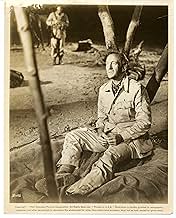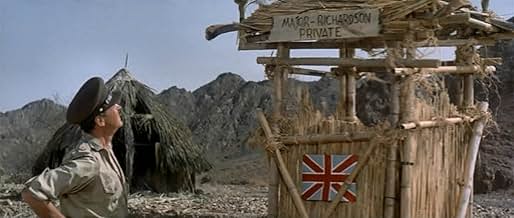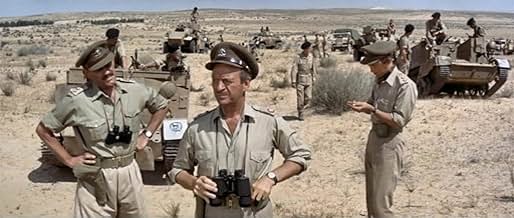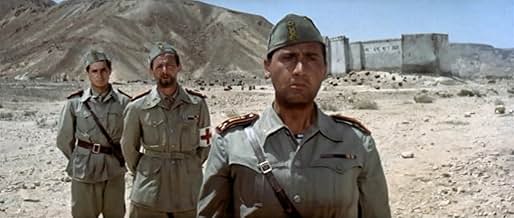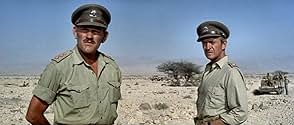In 1941 during the desert war in Abyssinia the Italian captain Blasi and the British major Richardson alternate between being bitter enemies or best friends depending on the circumstances.In 1941 during the desert war in Abyssinia the Italian captain Blasi and the British major Richardson alternate between being bitter enemies or best friends depending on the circumstances.In 1941 during the desert war in Abyssinia the Italian captain Blasi and the British major Richardson alternate between being bitter enemies or best friends depending on the circumstances.
- Nominated for 2 BAFTA Awards
- 1 win & 6 nominations total
Featured reviews
Saw this film while stationed at a remote site in the military. As I remember, it was one of the few movies, at the time, that really made me laugh. It so resembled the nuttiness of everyday military life. It displays attitudes of peoples from different cultures required to depend upon each other for survival. It shows that war, itself, is a national problem while the average soldier is really not so different from his enemy. If this were on DVD, I would purchase it, in a heartbeat. The truths brought forward in this story are as meaningful today as when I saw it in 1962. Best yet, every member of the military audience viewing it, laughed until they rolled. It didn't matter what their political orientation, the humor was there for all to see. If a fan of "King of Hearts", I recommend it.
The 'capture' sequence of the English patrol and the Italian patrol was filmed in Israel, a little way into the Negev Desert from the seaside town of Eilath.
I was an American student attending Tel Aviv University, on school break at the time, when the director of production hired me to play the role of the Ethiopian Bandit Chief who conducts the capture. However, one problem presented itself, though I was an 'African' American, I was not dark complected enough to play an Ethiopian!
The solution proposed was for me to 'live-on-the-beach' for a week until my skin was dark enough. This was the first and only time in my life that I was "paid to be Black!" Friends and family still chuckle about this singular 'experience' even today.
I was an American student attending Tel Aviv University, on school break at the time, when the director of production hired me to play the role of the Ethiopian Bandit Chief who conducts the capture. However, one problem presented itself, though I was an 'African' American, I was not dark complected enough to play an Ethiopian!
The solution proposed was for me to 'live-on-the-beach' for a week until my skin was dark enough. This was the first and only time in my life that I was "paid to be Black!" Friends and family still chuckle about this singular 'experience' even today.
I saw this movie in Killeen, Texas just after I returned from Kagnew Station, an Army Base in, then, Ethiopia. I had visited Italian and English War Cemetaries in Asmara. The main battle took place near Keren.
The movie takes place some distance south of either city after the fall of Asmara. The scenery was accurate and must have been filmed in the proper area.
The interplay between the British and the Italians was quite accurate and enjoyable. An example of the situation presented was cited in Under the Red Sea Sun where the author found the Italian officers still carrying their sidearms in Asmara.
One of the most ironic scenes in the movie takes place when the mountain tops surrounding the group is dotted with 'shifta.' The 'shifta' were trained by the English to help overthrow the Italian rule, but became independent entrepreneurs, a la Jesse James, after the fall of Asmara.
The movie takes place some distance south of either city after the fall of Asmara. The scenery was accurate and must have been filmed in the proper area.
The interplay between the British and the Italians was quite accurate and enjoyable. An example of the situation presented was cited in Under the Red Sea Sun where the author found the Italian officers still carrying their sidearms in Asmara.
One of the most ironic scenes in the movie takes place when the mountain tops surrounding the group is dotted with 'shifta.' The 'shifta' were trained by the English to help overthrow the Italian rule, but became independent entrepreneurs, a la Jesse James, after the fall of Asmara.
Another good war movie. Who says war movies need to have blood and violence? This was a battle of wits between the Italian commander and the British commander.
This movie has all the elements that precipitate war. Two armies that do not speak the same language with claims to past glory. And in the end they find themselves as men with a common goal - to survive in the desert.
The football scene was interesting in that, peeled down to basics, the men found a common passion. Could it be saying that conflict can be settled in a sportsmanlike manner? The funniest dialogue I found was when the British commander ordered the Italians to dig a latrine in the middle of the desert because it was the civilised thing to do. The Italian commander retorted, "My people were building sewers while your people were painting themselves blue."
This movie has all the elements that precipitate war. Two armies that do not speak the same language with claims to past glory. And in the end they find themselves as men with a common goal - to survive in the desert.
The football scene was interesting in that, peeled down to basics, the men found a common passion. Could it be saying that conflict can be settled in a sportsmanlike manner? The funniest dialogue I found was when the British commander ordered the Italians to dig a latrine in the middle of the desert because it was the civilised thing to do. The Italian commander retorted, "My people were building sewers while your people were painting themselves blue."
It is nigh on impossible not to like this film. It is not a 'classic' comedy by any means but cannot fail to raise a smile or two.
It is all down to the casting of course. David Niven is pitch-perfect as a none-too-competent Major and the always excellent Alberto Sordi is an obvious choice following his role in Risi's tragi-comedy 'Everybody go Home'.
There is marvellous support from Harry Andrews, David Opatoshu and Michael Wilding. We also have Michael Trubshawe who was known as Niven's 'mascot' and indeed gave his name to the pilot officer played by Robert Coote in Niven's best film 'A Matter of Life and Death'.
Director Guy Hamilton also has the aid of an infectious score by Nino Rota and cinematography by one of the best in the business, Giuseppe Rotunno. Quite a few had a hand in the script not least the prolific duo of Age-Scarpelli.
Peter Ustinov once observed that 'the army is the final repository of the fool'.
The characters in this film certainly do nothing to contradict that view!
The highlight is a touching scene between Niven and Sordi in which they show each other photographs of their loved ones. Rather than depicting the cruelty of war, this film simply depicts its absurdity.
Did you know
- TriviaFilm debut of Noel Harrison.
- How long is The Best of Enemies?Powered by Alexa
Details
- Release date
- Countries of origin
- Languages
- Also known as
- Liebenswerte Gegner
- Filming locations
- Israel(desert scenes)
- Production company
- See more company credits at IMDbPro
- Runtime
- 1h 44m(104 min)
- Color
Contribute to this page
Suggest an edit or add missing content



